This article was medically reviewed by Pradeep Adatrow, DDS, MS. Dr. Pradeep Adatrow is the only board certified Dentist, Periodontist, and Prosthodontist in the southern United States. With over 15 years of experience, Dr. Adatrow specializes in dental implants, TMJ treatments, periodontal plastic surgery, surgical and non-surgical periodontics, bone regeneration, laser treatments, and soft tissue and gum graft procedures. He received a BS in Epidemiology and Biostatistics from the University of Alabama and earned his Doctor of Dental Surgery (DDS) degree from the University of Tennessee College of Dentistry. Dr. Adatrow then completed a three-year postgraduate program in periodontics and implantology at Indiana University and went on to complete another three-year postdoctoral program in advanced prosthodontics from the University of Tennessee. He also serves as a full-time professor and the Director of Surgical Prosthodontics at the University of Tennessee. Dr. Adatrow received the Dean's Junior Faculty Award and the John Diggs Faculty Award, and he was inducted into the Deans Odontological Society. He is board certified by the American Board of Periodontology and is a Fellow of the prestigious International College of Dentistry – a feat that only 10,000 others worldwide can claim.
There are 9 references cited in this article, which can be found at the bottom of the page.
This article has been viewed 303,200 times.
Dentures will address the problem of missing teeth, but they may be uncomfortable or require periodic adjustments. When you first get them, you may notice a few sharp places that need adjustment. In addition, after a few years of wearing them, normal wear and tear will accumulate, and you’ll need to repair or replace them. It's not a good idea to try to fix them yourself, as you can damage your dentures.[1]
Steps
Filing and Other At-Home Solutions for Pain
-
1Know the risks. If you try to file your dentures yourself, you risk damaging them beyond repair. As dentures are expensive, you risk losing a large amount of money if you try filing them yourself. It's always best to ask your prosthodontist or dentist to adjust them.[2]
-
2Try a nail file. Some people do not like the length of certain teeth on their dentures, and they use a nail file for this purpose. Lightly rub it against the teeth you want to shorten, filing on the point or edge of the tooth. However, be sure to make small adjustments. You don't want to go too far when filing your teeth because it's difficult and expensive to repair them after you've filed too far.[3]
- As you file them down, keep stopping to check how far you've filed. Try not to go to far.
- Clean the dentures before putting them back in your mouth and checking your adjustments.
Advertisement -
3File off tags with a rotary tool. Sometimes, your dentures will dig into your gums because they don't fit properly. They may also have small tags leftover from manufacturing. Some people use rotary tools to make adjustments. Make sure to keep it on a very low rotation. The heat of a high rotation may damage your dentures, although any kind of repair can damage your dentures.[4]
- Identify where the problem is. When you have the dentures in, pinpoint exactly where they dig into your gums. Try to be very precise and gentle.
- Take them out of your mouth. Use the rotary tool to gently rub against that area, filing it down. Make sure to only take away a little at a time. Be sure to clean the dentures before putting them back in your mouth and testing the adjustment, so you don't irritate your gums with the filed surface.
- You can use a fingernail drill, for instance, or a crafting rotary tool. Use a bit that will let you sand off edges, such as a round- or oval-shaped bit.
-
4Try dental adhesives. When you first get dentures, your mouth needs time to adjust to the new teeth. To help your mouth out, you can use dental adhesives to hold them in place for the first few days. Eventually, though, the muscles in your mouth should adjust to keep your dentures in place, so you should only need to use them for a short time. Adhesive is helpful when you have pain as it holds your denture still in your mouth. Movement against an already sore spot will lead to an ulcer.
- You an also use adhesives as a temporary measure when they start to become loose after years of wearing. However, you need to have your dentist reline your dentures when they become loose, so you should only use the glue for a short while.[5]
- Every adhesive is a bit different. However, in general, you take the dentures out of your mouth and clean them. Shake some of the powder onto the gum side of the dentures. Put your dentures back in. Cream adhesive must be applied to a dry denture in order to work, rinse your mouth and then place denture onto a wet gum and wait five minutes before eating or drinking anything.
-
5Put your dentures in the freezer. One option some people use for helping to relieve pain, especially with new dentures, is to place them in the freezer. When you take them out, the cold will help soothe the pain in your gums.[6]
-
6Try a pain cream. Creams such as benzocaine topical can provide temporary relief from pain. Simply rub the cream on the painful area in your mouth, and it will numb the pain. Baby teething gel is available in most supermarkets. There are much stronger medications available, but if cost is a problem, or accessibility, then the baby gel is a good option. It is very safe and gives reasonable relief to sore spots on your gums.[7]
-
7Remove your dentures. If other options don't help, go ahead and take your dentures out for a bit. That will at least provide pain relief. See your dentist for help.
Having Your Dentist Fix Your Teeth
-
1Have your dentist examine your dentures. If you just got your dentures and they are not fitting properly, your prosthodontist should work with you to get them adjusted properly. You shouldn't be experience sharp pains, at the very least. Tell your dentist where it is hurting, and ask him or her to look for small surface tags or irregularities that may need to be filed down. You should also inform your dentist if you've had any bleeding or gum pain in the first few days of wearing the dentures.
-
2Ask about trimming. After your dentist identifies any issues with your dentures, he or she may recommend trimming them down. He or she will likely use a trimmers or trimming bur to adjust your dentures.
- Low-speed hand-pieces generate less heat and, therefore, won’t harm your dentures. And your dentist will have a variety of acrylic trimmers available, with varying degrees of roughness, so he or she will be able to customize the repair.
-
3Get your dentures polished. After trimming, your dentist can polish the dentures (except for the tissue surface, which would alter the fit). Polishing will make your dentures smoother and shinier.[8]
-
4Reline dentures after years of wearing. After you wear dentures for a period of time, they wear down your jaw bone, which means they won't fit as well. Most of the time, your dentist can reline them to fit better again. Sometimes, you may need new dentures.[9]
- Relining just means that your dentist adds material to the dentures to make them fit better.
- You can have soft lining or hard lining put in. The soft lining will only last a few months, but it can be good if you have trouble with harder dentures. It can be reapplied. Hard linings are made of resin and are meant to last longer.
-
5Try rebasing. Another, less common, procedure is rebasing. Basically, your dentist makes a new base for your dentures. The downside to this process is your dentist must keep your dentures for a few days. However, they should fit better when they come back to you.
-
6Check the fit. Once the dentures have been examined, trimmed, and polished, your dentist will evaluate the fit. First and foremost, let your dentist know if anything feels painful or uncomfortable. Then he or she will check for a variety of issues, including the extension of the flanges, the lip support, proper height, and your dentures affect your pronunciation
Expert Q&A
Did you know you can get expert answers for this article?
Unlock expert answers by supporting wikiHow
-
QuestionWhat is the best way to eat with new dentures?
 Cristian Macau, DDSDr. Macau is an oral surgeon, periodontist, and aesthetician at Favero Dental Clinic in London. He received his DDS from Carol Davila University of Medicine in 2015.
Cristian Macau, DDSDr. Macau is an oral surgeon, periodontist, and aesthetician at Favero Dental Clinic in London. He received his DDS from Carol Davila University of Medicine in 2015.
Doctor of Dental Surgery There can be a transitory period until you get used to them. If the feeling does not pass after a week and you find it hard to eat with them, make an appointment with your dentist. It is possible that the back margin of the denture is too long and touches the reflex centers in the back of your throat.
There can be a transitory period until you get used to them. If the feeling does not pass after a week and you find it hard to eat with them, make an appointment with your dentist. It is possible that the back margin of the denture is too long and touches the reflex centers in the back of your throat. -
QuestionMy new upper dentures are making me gag. Why is this happening?
 Cristian Macau, DDSDr. Macau is an oral surgeon, periodontist, and aesthetician at Favero Dental Clinic in London. He received his DDS from Carol Davila University of Medicine in 2015.
Cristian Macau, DDSDr. Macau is an oral surgeon, periodontist, and aesthetician at Favero Dental Clinic in London. He received his DDS from Carol Davila University of Medicine in 2015.
Doctor of Dental Surgery If you have them for the first time, you should eat with them as much as you can and wear them for longer periods in order to get used to them quickly. You should eat soft food. Try not to bite into hard pieces of food, such as apples, meat, or carrots. Always cut these foods into smaller pieces. Masticate with care in the beginning to avoid biting your tongue or cheeks.
If you have them for the first time, you should eat with them as much as you can and wear them for longer periods in order to get used to them quickly. You should eat soft food. Try not to bite into hard pieces of food, such as apples, meat, or carrots. Always cut these foods into smaller pieces. Masticate with care in the beginning to avoid biting your tongue or cheeks. -
QuestionIs it okay to file my dentures?
 Pradeep Adatrow, DDS, MSDr. Pradeep Adatrow is the only board certified Dentist, Periodontist, and Prosthodontist in the southern United States. With over 15 years of experience, Dr. Adatrow specializes in dental implants, TMJ treatments, periodontal plastic surgery, surgical and non-surgical periodontics, bone regeneration, laser treatments, and soft tissue and gum graft procedures. He received a BS in Epidemiology and Biostatistics from the University of Alabama and earned his Doctor of Dental Surgery (DDS) degree from the University of Tennessee College of Dentistry. Dr. Adatrow then completed a three-year postgraduate program in periodontics and implantology at Indiana University and went on to complete another three-year postdoctoral program in advanced prosthodontics from the University of Tennessee. He also serves as a full-time professor and the Director of Surgical Prosthodontics at the University of Tennessee. Dr. Adatrow received the Dean's Junior Faculty Award and the John Diggs Faculty Award, and he was inducted into the Deans Odontological Society. He is board certified by the American Board of Periodontology and is a Fellow of the prestigious International College of Dentistry – a feat that only 10,000 others worldwide can claim.
Pradeep Adatrow, DDS, MSDr. Pradeep Adatrow is the only board certified Dentist, Periodontist, and Prosthodontist in the southern United States. With over 15 years of experience, Dr. Adatrow specializes in dental implants, TMJ treatments, periodontal plastic surgery, surgical and non-surgical periodontics, bone regeneration, laser treatments, and soft tissue and gum graft procedures. He received a BS in Epidemiology and Biostatistics from the University of Alabama and earned his Doctor of Dental Surgery (DDS) degree from the University of Tennessee College of Dentistry. Dr. Adatrow then completed a three-year postgraduate program in periodontics and implantology at Indiana University and went on to complete another three-year postdoctoral program in advanced prosthodontics from the University of Tennessee. He also serves as a full-time professor and the Director of Surgical Prosthodontics at the University of Tennessee. Dr. Adatrow received the Dean's Junior Faculty Award and the John Diggs Faculty Award, and he was inducted into the Deans Odontological Society. He is board certified by the American Board of Periodontology and is a Fellow of the prestigious International College of Dentistry – a feat that only 10,000 others worldwide can claim.
Board Certified Dentist & Oral Surgeon It's best to have them adjusted by your dentist, who has the expertise to do so. If you file your own dentures, it's going to be at your own risk. Dentures are expensive and time-consuming treatments, and when you file them, you might alter and compromise their fit. You might even have to have them replaced.
It's best to have them adjusted by your dentist, who has the expertise to do so. If you file your own dentures, it's going to be at your own risk. Dentures are expensive and time-consuming treatments, and when you file them, you might alter and compromise their fit. You might even have to have them replaced.
References
- ↑ http://nedenturecenter.com/faqs/
- ↑ Pradeep Adatrow, DDS, MS. Board Certified Dentist & Oral Surgeon. Expert Interview. 5 November 2020.
- ↑ https://www.youtube.com/watch?v=naUI9nSZ7tg&feature=youtu.be&t=306
- ↑ https://www.youtube.com/watch?v=mxjAEMQgkWw&feature=youtu.be&t=9
- ↑ http://www.fda.gov/MedicalDevices/ProductsandMedicalProcedures/DentalProducts/ucm274258.htm
- ↑ http://www.thriftyfun.com/Remedies-for-Pain-from-Wearing-Dentures.html
- ↑ http://www.drugs.com/mtm/orajel-denture-plus.html
- ↑ http://www.ncbi.nlm.nih.gov/pubmed/16681500
- ↑ http://www.gotoapro.org/denturesfaq/
About This Article
To file down your dentures, start by lightly rubbing a nail file against the point or edge of the teeth that are bothering you. Make small adjustments to begin with, then clean the dentures and check their fit before filing any more, since you don’t want to file too much. Alternatively, you may want to use a rotary tool to remove tags left over from the manufacturing process, or to make adjustments to dentures that dig into your gums. However, dentures are expensive and easily damaged, so it’s best to ask your dentist to make any necessary adjustments. For more tips from our Dental co-author, including how to alleviate any pain caused by your dentures, read on!
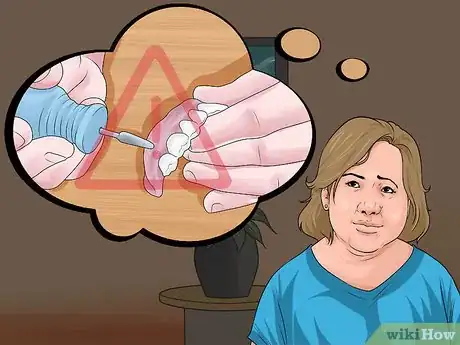

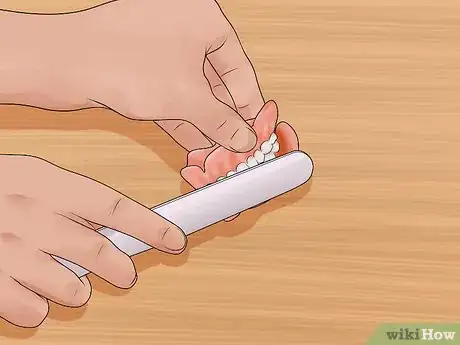
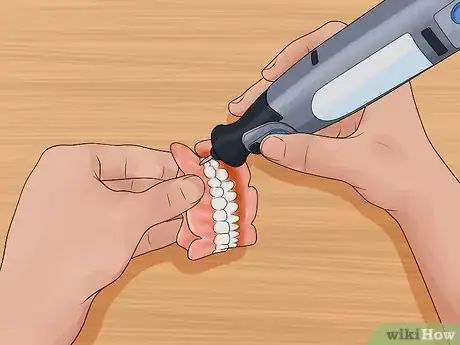
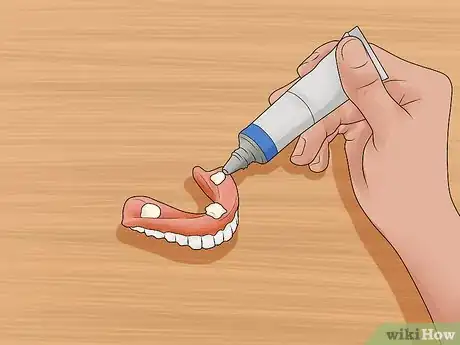
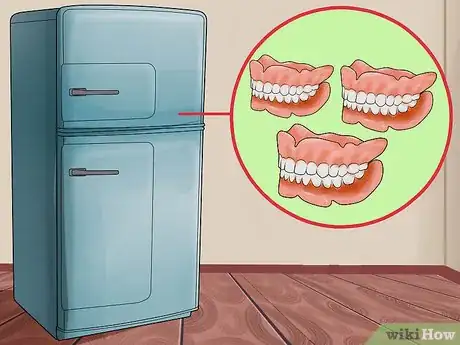

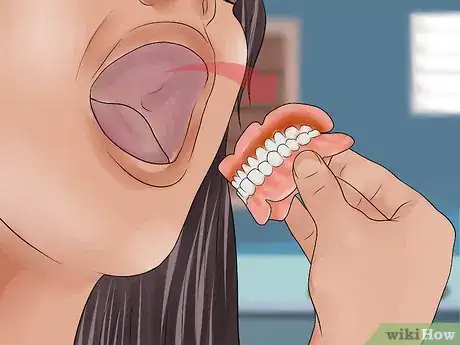
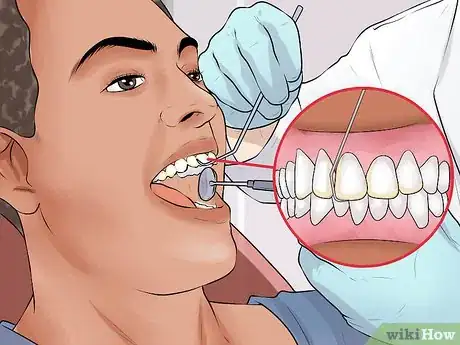
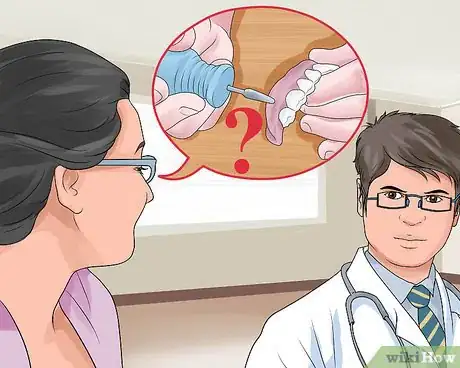
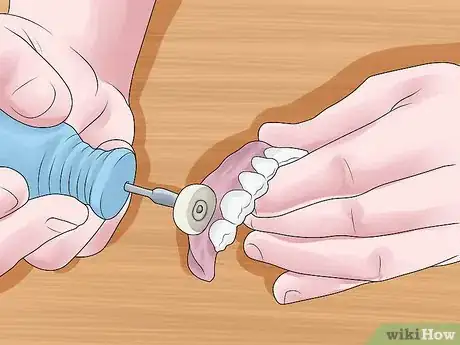
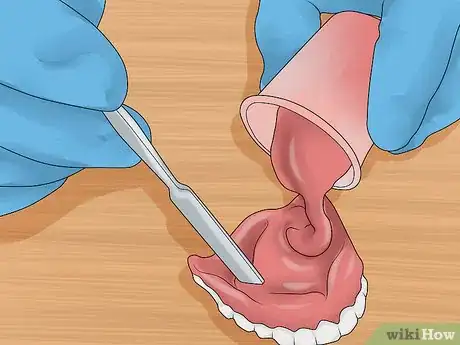
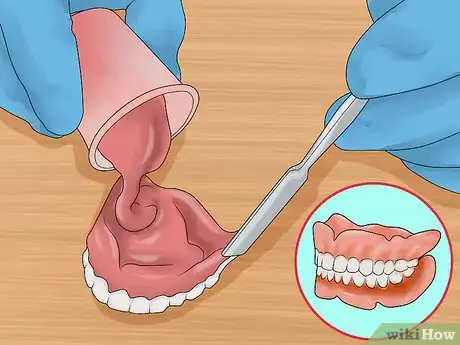
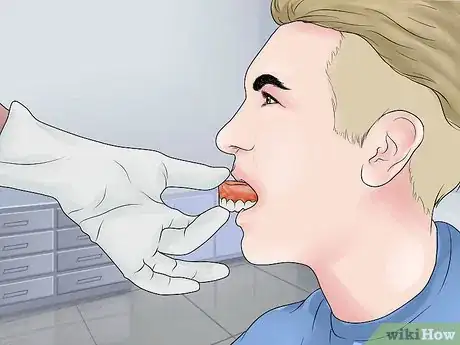
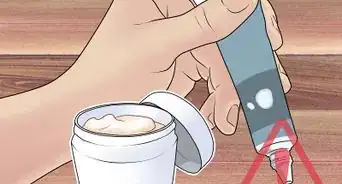

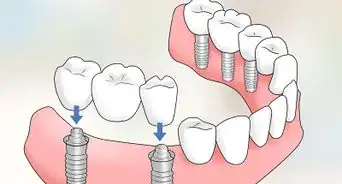

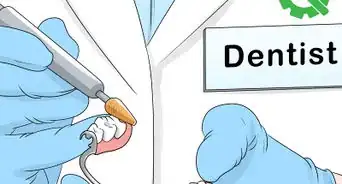
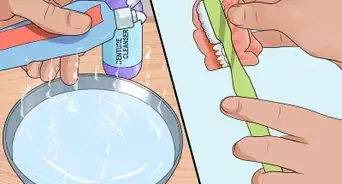

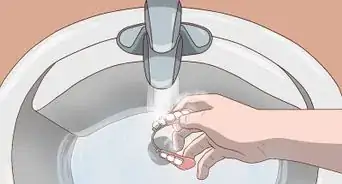
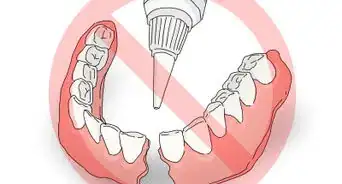
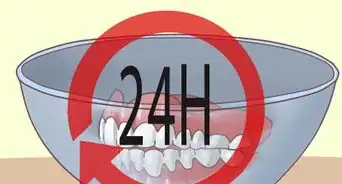










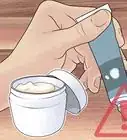

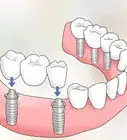




































Medical Disclaimer
The content of this article is not intended to be a substitute for professional medical advice, examination, diagnosis, or treatment. You should always contact your doctor or other qualified healthcare professional before starting, changing, or stopping any kind of health treatment.
Read More...